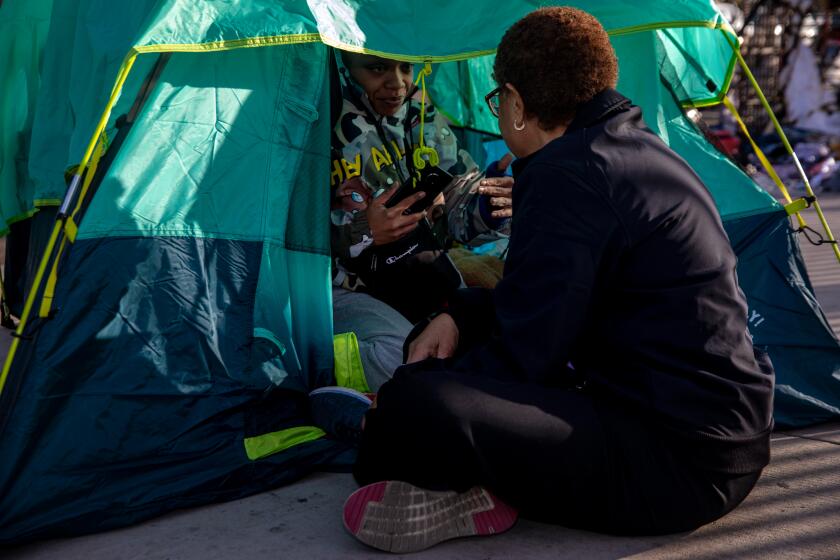Editorial: Mayor Bass goes big on homelessness spending proposal

It should be no surprise that in her first city budget proposal, Los Angeles Mayor Karen Bass went big on homelessness. As a candidate last year and now as mayor, Bass has been almost exclusively focused on helping ease the crisis and her $13-billion proposed spending plan reflects that by allocating $1.3 billion for existing and new homelessness programs — a record amount, her office said. She’s right to prioritize the humanitarian crisis on L.A.’s streets.
That includes $250 million for Inside Safe, the mayor’s ambitious initiative to clear encampments by moving people into motels and hotels temporarily while setting them on a path to permanent housing. Of that, $110 million would pay for hotel rooms, which is a huge expense because of pricey nightly rates. To help bring down costs over time, the proposed budget for the upcoming fiscal year provides $47 million to buy motels and hotels. Getting the city into the business of acquiring motels as “permanent infrastructure for temporary housing,” as Bass described it, is a recognition that solving homelessness is going to be a long-term investment.
She also wants to expand the city’s reach in providing services. Bass proposes hiring 13 outreach teams to work out of her office on Inside Safe. And rather than relying on the county to provide mental health and substance abuse care, Bass calls for using $23.5 million from settlements with opioid and tobacco companies to contract directly with treatment providers so the beds are available when individuals in temporary housing want help.
So far, the Inside Safe initiative has temporarily housed 1,000 people. That’s impressive. The harder part will be getting them into permanent housing.
The mayor’s budget also proposes adding staff in the planning and building departments to more quickly permit affordable and mixed-income housing developments. That’s important because homelessness is not solved by moving people into shelters and hotels rooms; it requires building more permanent housing that people can afford.
The spending plan would also tap about $150 million from Measure ULA for affordable housing, rental assistance for seniors and the disabled, and eviction defense. Measure ULA, the recently enacted tax on high-end real estate sales, is expected to generate more than $600 million during the fiscal year that begins July 1, but the ballot measure is being challenged in court, so the city is budgeting only a small portion of the estimated revenue in case the tax is revoked.
The mayor’s proposal now goes to the City Council, which will review, tweak and approve the final spending plan over the next month. Bass’ homelessness proposals are expected to find strong support among council members. (Her plan to boost police hiring is more controversial with some council members who want to shrink the Los Angeles Police Department force.)
Let’s get the lawsuit over Measure ULA in and out of court fast.
In announcing her budget, Bass differentiated between spending and investing. And she’s right to do so. Past mayoral administrations have spent money on homelessness as if it were a fleeting problem to be solved in a year or two with stopgap shelters or short-term programs. Bass rightly recognizes that the city’s homelessness and housing crisis is so deeply entrenched that it will take long-term funding and structural changes to prevent people from ending up on the streets.
But making permanent change is harder to do, especially now that the federal pandemic aid is mostly spent and the state is facing a deficit. The city will increasingly have to tap its own funds to continue and expand homeless aid programs. That means hard choices for the mayor and the City Council, particularly if there is a recession and revenue drops. The reality is that L.A. can’t afford not to invest in solving homelessness.
More to Read
A cure for the common opinion
Get thought-provoking perspectives with our weekly newsletter.
You may occasionally receive promotional content from the Los Angeles Times.












